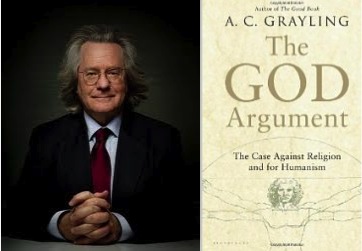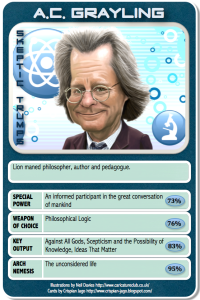Review of The God Argument by AC Grayling
A new book has been published laying out the case against religion and for humanism. It’s called “The God Argument: the Case Against Religion and For Humanism.” Seems simple enough, but this is by AC Grayling, immediate past president of the British Humanist Association and eminent British philosopher of decades’ experience and renown. Sam Harris took time for an interview on the book as well. Grayling is currently listed with “The Humanist Bible” aka The Good Book on the MAAF Book list. While authors are only given one book on the book list, this new publication by Grayling is one MAAF members may be interested in.
Humanism “places humanity in its natural setting” (242) and guards against the “saccharine horrors of heavenly bliss” (228). This short excerpt simplifies the book’s two sections: Against God and For Humanism. As a reviewer, I consider the first section Against God to be well-trodden ground to answer a question that has been well-answered before. The second section For Humanism provides a special opportunity to build a scholarly understanding of humanism. While we humanists are not beholden to apostles and prophets, Grayling is earned a place as one of the leading scions of humanism. Good humanists should take time to understand his perspective on living well.
He identifies seven qualities of a good life 7: meaning, relationships, activity, honesty, accountability, satisfaction, integrity (ie, consistency) (161). It is only an artifact of the brevity of this book review that I focus on a “list”, but it does provide a good insight into the book. One may simplify the list as simply meaning through enjoyable action and honesty. In addition, this is a distinctly collectivist approach: “at the heart of good lives, there are, invariably, good relationships.” (165).
This insight regarding the need for personal connections with others, on the basis of meaning and life stance, is something MAAF promotes through its chaplain outreach and Network of local communities. The military and its chaplains unfortunately continue to withhold support for our efforts.
One chapter in particular speaks directly to the military situation: Shared Humanity, Human Diversity (185). Much is made, rightfully, about the clash of cultures involved in military service. Young men and women are brought together from throughout the US, from many social situations and ethnic backgrounds. They are brought into a strong and directive military culture. The individual and their background, the local team, and the prevailing culture of the military mix in sometimes-volatile ways. Ensuring that all, in the end, are aligned collectively toward the military mission is the challenge of military leadership. Similarly, all of humanity has this challenge. As we mature as a species, we must celebrate our varied ethnicities, beliefs, values, and circumstances – our Human Diversity –, but still find a common ground upon which we can work together – our Shared Humanity. This effort is arguably the purpose of humanist philosophy.
Grayling did not confine himself entirely to philosophy in the book. He spent chapters on practical considerations of love, sex, drugs, and death. He took a progressive view of both. Of dying, he states, “in the project of seeking to live well… dying is a morally relevant matter of equally great importance.” (217) Grayling laments that we often place quantity of life above quality of life in our conversations about assisted suicide. He coins the term “thanatology” (thanatos meaning death, 233) to suggest a new medical field to steward the ethical and functional concerns of dying.
I could continue, but at this point, the best is to read. Grayling quotes Kant to define enlightenment: “Sapere Aude” (dare to know, 172). Sapere Aude is as good a motto as any for the atheist movement and a good first step for any prospective humanist. Similarly, The God Argument, has insights, inspirations, and arguments we should all, atheist, humanist, Christian, Muslim, or otherwise, should dare to know.
Parenthetical references refer to The God Argument by AC Grayling, © 2013 by Bloomsbury USA, 258 pages of content.
Book Contents
Section I Against Religion: Clarifications 13, Naming and describing ‘god’ 23, Origins of religion 35, axe to the root 41, knowledge, belief and rationality, 49, agnosticism, atheism and proof 57, theistic arguments 65, arguing by design 74, arguing by definition 83, causes, wagers and morals, 95, creationism and intelligent design 107
Section II For Humanism: three debates 131, Humanism: The Ethics of Humanity 139, Humanism and the good life 151, Putting the world to rights 177, shared humanity, human diversity 185, ethical and moral 191, humanist on love, sex and drugs 199, humanism, death, and the ends of life 217, religion revisited 237, humanism and the ethical dimension 247, The better alternative 255


